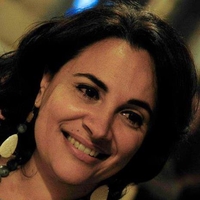stefania rimini
Università di Catania, Dipartimento di Scienze Umanistiche, Faculty Member
- Contemporary Drama, Television Drama, Documentary Film, Literature and Visual Arts, Visual Arts, Creative Writing, and 24 moreContemporary Poetry, Literature, Gender Studies, Art History, History, Performing Art, Dance, Drama, Ballet, Music, Acting, Queer Theory, Pier Paolo Pasolini, Marjane Satrapi, Ascanio Celestini, Philosophy, Critical Theory, Italian Performer, Film Studies, Contemporary Art, Visual Studies, Derek Jarman, Television Studies, and Queer Cinemaedit
Emma Dante is one of the most radical stage directors of the Italian contemporary theatre scene. With Bestie di Scena, which does not follow the traditional rules of staging, she has provoked ambiguous reactions among critics. This essay... more
Emma Dante is one of the most radical stage directors of the Italian contemporary theatre scene. With Bestie di Scena, which does not follow the traditional rules of staging, she has provoked ambiguous reactions among critics. This essay focuses on the theme of nudity as an expressive value and tries to identify the most evident links with painting and cinema.
Research Interests:
Research Interests:
This essay attempts to draw an innovative map of melodramatic sensitivity according to specific criteria of genre and form. It derives its inspiration from themes found in Fassbinder's cinematgraphy - such as the complex interplay of... more
This essay attempts to draw an innovative map of melodramatic sensitivity according to specific criteria of genre and form. It derives its inspiration from themes found in Fassbinder's cinematgraphy - such as the complex interplay of love, power and desire - and then proceeds on three different axes based on The bitter tears of Petra von Kant, A Streetcar Named Desire andVeronika Voss. Each section analyzes its subject in parallel with with some theatre revisions, combining thematic issues and semiotic patterns.
